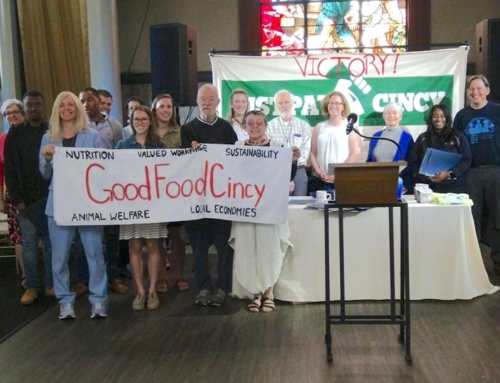OVER-THE-RHINE Local labor activists, farmers and food worker union members say a program established in California could be a model for Cincinnati publicly funded institutions to improve their sourcing practices.
The Interfaith Workers Center is part of a group studying how to implement Cincinnati’s version of the Good Food Purchasing Program, which was launched in Los Angeles a few years ago.
The Los Angeles Food Policy Council created the program to provide city institutions with purchasing guidelines and strategic support centered on the procurement of local, sustainably, and humanely produced foods. The goal is to encourage institutions to direct their buying power toward suppliers that meet benchmarks in five criteria: local sourcing, healthy, environmental sustainability, humane food production and fair compensation of workers.
Spach compared the food program as being similar to the U.S. Green Building Council’s Leadership in Energy and Environmental Design program, which has prompted interest and attention in sustainable building design and “green” architecture.
“It’s critical to create a coalition of worker justice and food policy councils to ensure the success of the program,” said Christina Spach, an organizer for the Food Chain Workers Alliance, a Los Angeles-based coalition of unions and food worker advocacy organizations.
Spach recently spoke at the Interfaith Workers Center about the Good Food Purchasing Program and handed out literature to event attendees.
The push to even study the issue came as a recommendation from a task force on food policy former Mayor Antonio Villaraigosa created in July 2010. By 2012, the city of Los Angeles and the Los Angeles Unified School District were among the first groups to sign a pledge to track results using the program’s scorecard.
Cincinnati advocates say the Good Food Purchasing Program is an attempt to address looming issues in the food production industry such as stagnant wage growth. In a region known for its processed food production, food industry workers in Cincinnati are paid $10.27 an hour on average, down 6 percent from a year earlier, according to the Bureau of Labor Statistics.
Groups in cities such as San Francisco, Chicago, Cleveland and Columbus are discussing or taking steps to implement similar programs.
The question now is whether public entities including schools, hospitals and jails will adopt the program.
“This is a way to get companies to comply with existing laws, while helping the economy,” said Brennan Grayson, director of the Interfaith Workers Center in Over-the-Rhine. “It will also keep companies from paying poverty wages then forcing them on public assistance.”



